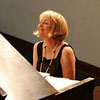Home » Jazz Articles » Album Review » Gini Wilson Quartet: The Crossing Point
Gini Wilson Quartet: The Crossing Point
Wilson is a highly trained musician who is informed by the best elements of classical music and jazz. Emotion-drenched chord progressions, a percussive right hand and effortlessly floating harmonies are just a few of the tools she employs to convey her deeply personal musical statements. Wilson's precise execution sounds nothing short of regal on Heckman's invigorating "Tango d'Amour Perdu," while her memorable "Mountain Path/Mountain Meadow" swings on a deliciously Monk-ish theme with the help of intelligently crafted passages by Heckman on soprano.
As strong as the up-tempo numbers are, Gini Wilson seems far more at ease with descriptive compositions like Jimmy Rowles' "The Peacocks" and her moving tribute "The Fires Of September (9-11)." These tracks reinforce Wilson's reputation for delicate, deeply emotional playing and they open up wide spaces for her to flex her considerable skills. But in jazz, it doesn't take long for impressionism to turn somnambulant, as her approach begins to veer dangerously into muzak territory on songs like "Luminoso." Similarly, her interpretation of Eric Satie's composition "Satie In The Sahara" would have been more compelling if played with more vigor. Much more enjoyable are Wilson's dazzling displays of technique on the waltzing "Smith's Song," the mystic melodicism of Wayne Shorter's "Aung San Suu Kyi" and the seductive Astor Piazzolla tango "Adios Nonino."
The closing track "J.S. Monk" is at once a playful song and an object lesson of why The Crossing Point falls a bit short of Wilson's musical vision. While most of the record finds Wilson bouncing from classical to jazz, "J.S. Monk" finds her blending jaunty Bach-inspired melodies with Monk-inspired staccato bursts, galvanizing the two styles in the process. It's the closest she comes to "chamberjazz" in the entire recording. Of course, there's no hiding that Wilson's strength rests firmly on the classical side of the equation. But music this tasteful and accomplished cannot be bound by genres. The Crossing Point is a compelling listen for those with open ears.
Track Listing
1. Mountain Path/Mountain Meadow 2. Tango d'Amour Perdu 3. The Peacocks 4. Satie In The Sahara 5. Aung San Suu Kyi 6. Adios Nonino 7. Gary's Theme 8. Smith's Theme 9. The Fires Of September (9-11) 10. Luminoso 11. J.S. Monk
Personnel
Gini Wilson
pianoGini Wilson: piano. Steve Heckman: flute, soprano and tenor saxophone. Paul Breslin: bass. John Wiitala: bass. Ron Marabuto: drums.
Album information
Title: The Crossing Point | Year Released: 2003 | Record Label: Music Wizards
< Previous
Nemesis
Next >
XL - Largely Visual Show
Comments
Tags
For the Love of Jazz
 All About Jazz has been a pillar of jazz since 1995, championing it as an art form and, more importantly, supporting the musicians who create it. Our enduring commitment has made "AAJ" one of the most culturally important websites of its kind, read by hundreds of thousands of fans, musicians and industry figures every month.
All About Jazz has been a pillar of jazz since 1995, championing it as an art form and, more importantly, supporting the musicians who create it. Our enduring commitment has made "AAJ" one of the most culturally important websites of its kind, read by hundreds of thousands of fans, musicians and industry figures every month.




















